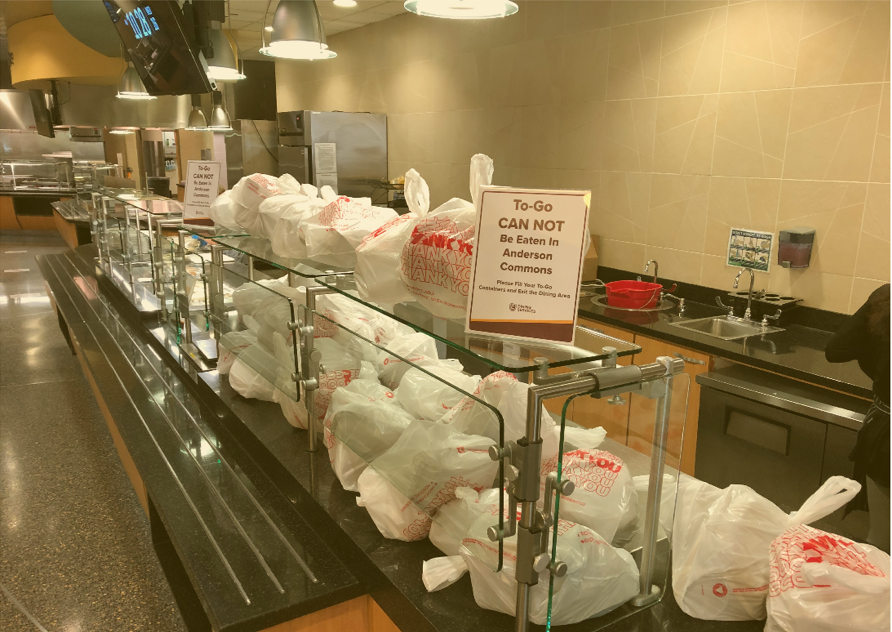Two plastic containers, a plastic cup and plastic silverware, neatly wrapped in a plastic bag. The to-go option for Anderson Commons shows the reality of living in a pandemic, and while the convenient option lessens traffic in Anderson Commons, the single-use containers and utensils are an on-campus example of COVID-19’s environmental impact.
Most of the decisions being made on campus for safety purposes have come straight from the Minnesota Department of Health (MDH).
“They developed the guidelines in terms of what is recommended for campuses and dining centers on campus. That’s where we get our information,” said Nicole Crouch, director of Dining Services.
Concordia has also looked to its neighbors across the Red River for guidance. Crouch detailed that North Dakota State University in Fargo uses the same to-go containers as Concordia because of their ability to handle hot food and soups.
“We always consider sustainability as one of our main areas to focus on,” said Crouch.
Some waste is inevitable. If you get the to-go option from DS, you will have to use the plastic containers. But Jackie Maahs, the sustainability coordinator for Concordia, offers some advice on how to be as sustainable as possible. If it is an option for you, eating in Anderson Commons is the best way to avoid creating unnecessary waste.
“If you can feel comfortable eating within DS, and think that is a route you can take, or if it’s in your schedule, or however that works for you, that’s how you’re going to reduce the most waste,” said Maahs.
Not everyone can eat in Anderson Commons at once, which is why the to-go system is in place. When you do get the to-go option, Maahs believes it is important to recognize what you do not need to take.
“If you are going to do a takeout meal, use your own utensils, use your own napkins,” she said.
While made to throw away, parts of the to-go meals can be reused. Maahs suggests using your plastic bag as a trash bag in your room, reusing the plastic cup at home or even using the plastic utensils for your next meal.
“You can reuse a plastic fork, there’s no reason you should throw that away. You can reuse that three, four or five times and it’s fine,” she said.
For recycling, Concordia uses MinnKota, the only large-scale, commercial recycling company in the area. Maahs emailed Concordia’s MinnKota sales representative with photos and details of all the materials dining services provides, “Like the cups and the little canisters, the different clamshells. And she said none of it is recyclable.”
While Concordia does promote the recycling of #1, #2 and #5 plastic, MinnKota only accepts bottles and jugs of those plastic numbers.
Since none of the packaging offered with to-go meals is recyclable on campus, they have to be thrown away. Putting it into a recycling container on campus will contaminate the whole container and then everything in it will have to be thrown away.
Residential recycling is taken care of by the City of Moorhead, which does accept the plastic containers used for to-go meals. While this difference in service offers a recycling option for students living off campus, those on campus still do not have a place to recycle their containers.
Last year, the Maize began a green to-go option. Customers would pay a one-time fee for a reusable container and they could exchange it for a clean one each time they came back to the Maize. That way, less waste was generated from to-go food. Unfortunately, the MDH raised the issue of returning the used containers and how that could be done in a sanitary manner.
“It became extremely difficult for us to fathom how students were going to be returning the to-go containers,” said Crouch.
While the green to-go option helped reduce waste, it cannot continue during the COVID-19 pandemic.
Kenneth Foster, chair of the president’s sustainability council and professor in the sustainability studies program, believes the pandemic is a good chance for reflection on the various trade-offs we make in our day-to-day lives.
“We’re willing to increase the amount of plastic that goes to the landfill because we want to reduce the opportunities for the spread of the virus,” said Foster.
“It bums me out when students feel guilty for things that aren’t sustainable, especially when it’s out of their control,” said Maahs.
Reduce, reuse, recycle. We should always prioritize reducing our waste before we consider reusing it or recycling it.
“If we can’t reduce it through interaction with DS, what are other ways we can reduce waste?” said Foster. “Whether it’s wasting energy, wasting clothing or other kinds of things.”
Maahs also suggested reducing waste in other parts of our lives by doing things like taking up “meatless Mondays,” and believes we should find pride and success in the areas of our lives where we can make a difference.

